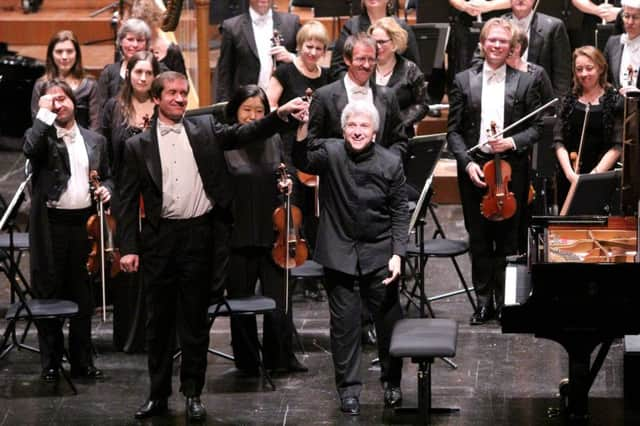Classical review: RSNO: Prom 63, London


RSNO: Prom 63
Royal Albert Hall, London
****
Neither Nicholas Kenyon nor Roger Wright managed to avoid this trap, so a big hand for Edward Blakeman, who has been masterminding the interregnum between the departing Wright and the incoming David Pickard, for the most interesting Proms season in years, including an unprecedentedly large quota of forgotten gems.
The RSNO opened their Prom on 2 September with a real rarity: Messiaen’s Hymne. This was composed as a passionate act of religious homage in 1932 – its original title was Hymne au Saint-Sacrement – but when Messiaen’s publisher sent the manuscript to supposed safety in Lyon during the Second World War it was destroyed in battle. When Leopold Stokowski – conductor of Disney’s Fantasia! – enquired about the work in 1945, Messiaen obligingly reconstructed the whole thing from memory.
Advertisement
Hide AdThe RSNO rendered its quintessentially Messiaen-style chords and textures with radiant exuberance, letting the hushed ecstasy of the main theme brim with religious fervour. There were echoes of Bartok, Debussy, Ravel, and Stravinsky – all Messiaen’s heroes – but this youthful work carries his own unmistakable stamp in every bar.
Then came the centrepiece of the evening. Very much a rising star at present, the young Russian pianist Igor Levit laid his cards on the table in his initial entry in Concerto No 27 in B flat major – Mozart’s farewell to the form – with a touch so delicate as to seem weightless, and with an intimately confiding sound.
With sensitive support from conductor Peter Oundjian and the RSNO, every note in his performance was fastidiously placed, every phrase beautifully sculpted: it was like listening to a speech by a master-orator who never needs to raise his voice. Yet when it fell to him to lead the orchestra into new realms in the first-movement development, and in the sequence of small quasi-cadenzas which stud the finale, he had all the authority required. His encore – Shostakovich’s Waltz-Scherzo – was a comic tour de force, played pianissimo throughout.
With Bruckner’s Symphony No 7 in E major, the RSNO showed what they are made of, and in what excellent form they currently are. It’s significant that they are now making big connections with the wider community – initiating a composing competition for 12-18 year olds, and even devising a scheme to draw toddlers into the enjoyment of classical music – and their playing reflects this urge to spread the word. Bruckner’s massive work – which signalled his own final acceptance by a sceptical German public – here emerged in all its glory.